#homophobia in bl
Text
Turtles Catches Up With Old GMMTV: Dew the Movie Edition
[What’s going on here? After joining Tumblr and discovering Thai BLs through KinnPorsche in 2022, I began watching GMMTV’s new offerings -- and realized that I had a lot of history to catch up on, to appreciate the more recent works that I was delving into. From tropes to BL frameworks, what we’re watching now hails from somewhere, and I’m learning about Thai BL's history through what I’m calling the Old GMMTV Challenge (OGMMTVC). Starting with recommendations from @absolutebl on their post regarding how GMMTV is correcting for its mistakes with its shows today, I’ve made an expansive list to get me through a condensed history of essential/classic/significant Thai BLs produced by GMMTV and many other BL studios. My watchlist, pasted below, lists what I’ve watched and what’s upcoming, along with the reviews I’ve written so far. Today, I’ll cover Dew the Movie, screenwritten and directed by the seminal Thai BL artist, Ma-Deaw Chookiat, and starring Ohm Pawat and Nont Sadanont.]
Before I get started, I want to note that I’m publishing this review out of chronological order from the list: I owe you all a review of 3 Will Be Free, which will drop next week, but I just watched Dew the Movie this week, and felt the strong urge to get out my thoughts sooner rather than later.
Why?
I have had a number of quick conversations about Dew the Movie with some of the around-the-block mentors on Tumblr, particularly with @absolutebl Sensei, who very kindly answered my question last week about where Dew stands by way of the trajectory of BL in Thailand (and just to note, as ABL Sensei says in their answer: Dew is most definitely NOT a BL, but an important piece of queer media to consider for the BL-driven OGMMTVC).
The (small sample size) majority of people I’ve spoken to about Dew have actually not seen it, which is utterly understandable from the perspective of the tragic circumstances of the film.
When I first planned on watching it, I put a caveat note on the OGMMTVC list on my blog’s pinned post that Dew wasn’t an official part of the Challenge. I change my tune on this: I would argue, at least from my perspective, that it was a *must for me* to watch.
Again, why?
As ABL Sensei writes, Dew fits into a stage-checklist mold of queer cinema, where, at the time of its release, it potentially NEEDED to check off certain boxes in order to get produced. It very well may have NEEDED a tragic end (arguably, multiple tragic ends) to get made. It may have NEEDED to kill off a gay character (arguably, multiple gay characters) to be ripe for consumption by a wider audience. It may have NEEDED some amount of equivocating about those deaths within the art itself.
I was aware of this when I was watching Dew, aware of watching Brokeback Mountain again, aware of death and disappearance and erasure.
What I didn’t expect from Dew, possibly as strong a punch in the gut as the impact of the death(s) themselves, was how Asian the movie was.
This sounds silly, coming from an Asian-American towards a Thai movie made in Thailand, about Thai young men, as based on an original story from South Korea. But having visited Malaysia, one of my home countries, a whole bunch in the 1990s, at the same time when half of this film was situated -- I was absolutely struck by how the film did not shy away from the Asian experience of discrimination and the destruction of Asian family systems by way of homophobia and other explicit biases throughout the film.
The depictions of homophobia and discrimination in Dew were so raw that I caught myself actually gasping-crying at certain points. Before I get there, let me offer a quick summary of the film, since I believe not very many people have seen this:
Dew and Phop are two high school classmates in the late 1990s, in an extremely rural town called Pang Noi, adjacent to Chiang Rai. As the wonderful @shortpplfedup kindly noted for me, the timing of Dew and Phop’s engagement took place right before the onset of the 1997 Asian financial crisis that first emanated out of Thailand, and was also set as military dictatorships had given way to democracy in Thailand.
In their rural town, young men who are either out or presumed to be gay are sent to training camps. Accusations about the spread of AIDS are made vis à vis the LGBTQ+ population. Students who are out are rejected at school and in their homes.
I’ve written previously about how certain BLs, mainly in the MAME realm (Love By Chance and TharnType), have touched upon a kind of bigotry and bias that I have described as being particularly Asian in nature, reflective, word-for-word, of the kind discriminatory language and ideas that I was exposed to as a kid from my Asian parents.
To see that kind of discrimination and homophobia orchestrated on a community-based level -- in Dew and Phop’s school, when children are rounded up by teachers and soldiers to be sent to a training camp -- was brutal to watch.
It immediately introduced a level of dystopia to the entire film. And I ended up appreciating that the film went that far, so immediately at the beginning of the film, after we had seen an otherwise happy-go-lucky young man in Dew beginning to engage with Phop.
We needed that element of dystopia to kick off the film, because: Dew faces rejection from his school and, potentially, from his single mother, to be an out and gay young man in Pang Noi.
More brutally, arguably, is the rejection of Phop from his EXTREMELY patriarchal Thai-Chinese family, led by an almost despotic father, who is ready to take down his son at a moment’s notice, with a helpless mother present as Phop is progressively rejected by his father, his brothers, and the patriarchal family system that keeps that family together. (@shortpplfedup, as I wrote to you, this was Double Savage x 10, maybe x 100.)
The reason why I liked the juxtaposition of the community-level discrimination vs. the micro, family-level discrimination is that both experiences of this kind of discrimination are dystopic. As humans, as mammals: we crave community, family, and companionship.
To be rejected by your community is unnatural. To be rejected by your FAMILY is unnatural.
This is not a message that’s limited to Asian media or Asian cultures -- this exact kind of discrimination flourishes in America and elsewhere, including conversion therapy (Dew reveals that his own mother sent him to behavioral therapy). In rural Thailand, this kind of existence... simply cannot exist. That’s dystopic to queerness, to the LGBTQ+ community.
I brought up Malaysia earlier to make a quick mindset comparison. Around the time of the setting of Dew and Phop’s high school days, I remember hearing on Malaysian radio, riding in a car with my family, that the singer Sting (STING, y’all -- vanilla STING) had been banned from performing in Malaysia for his music being “too rhythmic.”
Malaysia, unlike Thailand, is an Islamic nation. But borders are only lines on a map, and as I’ve spoken at length with the amazing @telomeke about, the cultural flow between the countries is strong and present. It doesn’t surprise me, therefore, that rural Thai towns WOULD engage in this HIGH LEVEL of discrimination and exclusion, as unbelievable as it might seem to Westerns not familiar with either Asian or Western styles of dystopic discrimination, as I’m calling it here.
To try to survive: Phop runs away to Bangkok. And begs Dew to come with him. And Dew dies in the process.
Phop lives. He becomes an adult, a middling adult, with only middling success in his life. After a life in Bangkok, he moves back to Pang Noi, broke, married, reminiscing about Dew.
And he discovers, after becoming a homeroom teacher, that Dew has been reincarnated in the body of a young female student. (This is one of a few times that ideas of ghosts, spirits, the reborn, and the reincarnated are introduced in queer Thai media in 2019, along with Until We Meet Again and He’s Coming To Me.)
We then get the presence of an actual controversial filmmaking trope in age gap, between a young student and an older teacher. Age gap is certainly a present trope in BLs, past and present.
In lightly peeping the MDL reviews for Dew, I saw quite a bit of consternation about this age gap, and honestly, as a mom, I certainly felt the wibbles as well. But I thought it was an interesting filmmaking device to use, in putting Dew’s spirit in the body of a young student.
Because -- of course -- this inclusion forces us viewers to confront OUR OWN BIASES. Besides the community-level and micro/family-level discrimination we see in the film, we’re also forced to truly dig into what we, as viewers, are biased against. AND, the film very much digs into the controversial nature of teacher-student relationships as well, and Phop is condemned for his closeness with the reincarnated Dew through the student, Liu, wonderfully acted by Pahn Riety of 10 Years Ticket.
This film is fucking brutal. But the fact that it forces us to CONFRONT OUR BIASES, on so many levels -- it does a wonderful job at that.
To the end. To the end of the loss of Phop and Liu, so that Phop and Dew can be together in the afterlife.
The film leans on Thai-Chinese Buddhism in the second half, again, so reminiscent of He’s Coming To Me, leading to ANOTHER non-happy ending that brings two people together in unideal circumstances. Phop and Dew’s spirits will be together, not in this world, but where, exactly? Certainly not in the world of 1990s rural Thailand, a world that wanted them extinct.
When I say that this film is rooted in its Asianness, I really mean it. I think one needs to have an appreciation for how these themes tie together -- the community-level discrimination, how general sexuality and queerness were treated with such a hands-off/ignoring approach in the SEA region in the 1990s, and why Thai-Chinese Buddhism was chosen as a means of bringing Phop and Dew back together, just like Thun and Med in HCTM. There is an acknowledgement by the Asian filmmakers of these pieces that queerness was brutally unacceptable during these times in Thailand and elsewhere, and these pieces do not shy away from that reality.
I’m tremendously glad I watched this. I feel like crying right now while watching this, but I’m really glad, as someone with SEA roots, to have watched this, and to have seen discrimination at that level that I have seen previously, and to know it exists. If one takes up the OGMMTVC and feels like they can’t watch this, I can totally understand. But I think Dew the Movie is a tremendous gateway -- as He’s Coming To Me was -- to a very particular Asian mindset around collectivist living that does not jive with individual expressions of sexuality and queer acceptance.
Those realities are brutal -- I hate thinking about them, I HATE IT. The acceptance gateway that I have discovered vis à vis Thai QLs is a salve to my soul that was subjected to HEINOUS discrimination against ANYONE deemed different from my Indian culture growing up. But that discrimination was also VERY REAL. I’ve broken out of being exposed to it, and I’ve tried to become the best ally I can be. But the acknowledgement, through art, that that level of discrimination can exist, in my Asian cultures, is also a reality that I have a responsibility, as an ally of Asian descent, to reckon with.
(A quick side-note. Once more: Ohm Pawat shines. This man is a CIPHER of queer pain and queer joy. The acting, directing, and cinematography of this film was stunning. Two hours went by in a flash. If you avoid for the content, that makes sense, but if you’re a film buff, you may enjoy this film just for the devotion it pays to rural Thailand and the spectacular expanses that it captures.)
[Yow. My heart is aching, not just for Dew the Movie, but I’m also recovering from a crazy week of Step By Step, HA.
But anyway: my review of 3 Will Be Free will be up early next week. WHAT A GODDAMN AMAZING SHOW! The OGMMTVC is definitely ruining me for great content, up against what I’m watching that’s airing now (....side-eyes to SBS, hmph).
And: I’m digging into Until We Meet Again. IT’S FABULOUS SO FAR. Come AWN, Fluke and all of ‘em! I’m traveling for the holiday next week, but hopefully my watch schedule won’t get too messed up. But with this review of Dew and 3WBF next week, I’m holding all y’all down if you’re looking forward to these reviews!
Here’s the status of the watchlist. As ever, I’ll take any feedback ya got!
1) Love Sick and Love Sick 2 (2014 and 2015) (review here)
2) Make It Right (2016) (review here)
3) SOTUS (2016-2017) (review here)
4) Make It Right 2 (2017) (review here)
5) Together With Me (2017) (review here)
6) SOTUS S/Our Skyy x SOTUS (2017-2018) (review here)
7) Love By Chance (2018) (review here)
8) Kiss Me Again: PeteKao cuts (2018) (no review)
9) He’s Coming To Me (2019) (review here)
10) Dark Blue Kiss (2019) and Our Skyy x Kiss Me Again (2018) (review here)
11) TharnType (2019-2020) (review here)
12) Senior Secret Love: Puppy Honey (BL cuts) (2016 and 2017) (I’m watching this out of order just to get familiar with OffGun before Theory of Love -- will likely not review)
13) Theory of Love (2019) (review here)
14) 3 Will Be Free (2019) (not a BL or an official part of the OGMMTVC watchlist, but an important harbinger of things to come in 2019 and beyond re: Jojo Tichakorn pushing queer content in non-BLs) (review coming)
15) Dew the Movie (2019)
16) Until We Meet Again (2019-2020) (watching)
17) 2gether (2020)
18) Still 2gether (2020)
19) I Told Sunset About You (2020)
20) YYY (2020, out of chronological order)
21) Manner of Death (2020-2021) (not a true BL, but a MaxTul queer/gay romance set within a genre-based show that likely influenced Not Me and KinnPorsche)
22) A Tale of Thousand Stars (2021) (review here)
23) A Tale of Thousand Stars (2021) OGMMTVC Fastest Rewatch Known To Humankind For The Sake Of Rewatching Our Skyy 2 x BBS x ATOTS
24) Lovely Writer (2021)
25) Last Twilight in Phuket (2021) (the mini-special before IPYTM)
26) I Promised You the Moon (2021)
27) Not Me (2021-2022)
28) Bad Buddy (2021-2022) (thesis here)
29) Bad Buddy (2021-2022) and Our Skyy 2 x BBS x ATOTS (2023) OGMMTVC Rewatch
30) Secret Crush On You (2022) [watching for Cheewin’s trajectory of studying queer joy from Make It Right (high school), to SCOY (college), to Bed Friend (working adults)]
31) KinnPorsche (2022) (tag here)
32) KinnPorsche (2022) OGMMTVC Fastest Rewatch Known To Humankind For The Sake of Re-Analyzing the KP Cultural Zeitgeist
33) The Eclipse (2022) (tag here)
34) GAP (2022-2023) (Thailand’s first GL)
35) My School President (2022-2023) and Our Skyy 2 x My School President (2023)
36) Moonlight Chicken (2023) (tag here)
37) Bed Friend (2023) (tag here) (Cheewin’s latest show, depicting a queer joy journey among working adults)]
#dew the movie#dew#dew the movie meta#phop x dew#dew x phop#ohm pawat#nont sadanont#pahn riety#age gap bl#homophobia in bl#discrimination in BLs#turtles catches up with old gmmtv#turtles catches up with thai BLs#turtles catches up with the essential BLs#the old gmmtv challenge#ogmmtvc
80 notes
·
View notes
Text





Heartbreaking.


Chihiro's suffering and pain and the way he loses his job and everything he was hoping to achieve with that and then having to act like it's not a big deal because he desperately escapes his pain by making it not a big deal, by downplaying himself again and again.




And how he just shrinks after this and he's so tiny and it's not different but it is to all the people who've ever mattered to him and sow hat does it matter if he doesn't think it's different if everyone else does?
And then the necklace falls off and it feels like a sign, like the world is telling him to give up on his heart and his love and his life and he's not going to fight it, he's not going to even try. Why would he?
#happy of the end#homophobia#japanese bl#japanese bl series#jbl#japanese bl drama#jdrama#japanese drama#japanese series#bl drama#bl series#asianlgbtqdramas#asian lgbtq dramas#i am deeply hurt for my beloved boy#i would like to save him
51 notes
·
View notes
Note
Hi! apologies if you've answered this before, but can you recommend some bls that deal with homophobia, be it internalised or external? or more generally, bls that are not set in the bl bubble where gayness is 100% accepted?
Thank you very much <3
Ooo, sure thing!
BL's Not Set in The Bubble
BLs that deal with homophobia (internal or external) and rough coming out sequences
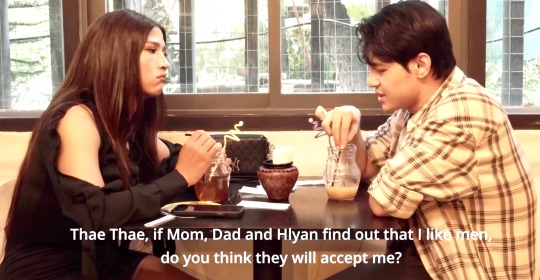
Began Beginning from Myanmar is all about this. It's not a BL I would necessarily recommend but it is interesting for many reasons. Both leads are dealing with massive internalize homophobia, among other issues.
Similarly: Like in the Movies and Tie the Not from the Philippines.
And Goodbye Mother and Nation's Brother from Vietnam.
From Thailand
To Sir, With Love - witnessing his family's massive homophobia that results in major tragedy as a child is what drives our main character's whole personality and self hatred. Massive trigger warning.

Until We Meet Again - the pair in the past, of course, it's the driving trauma of the relationship reincarnated. Massive trigger warning.
I Feel You Linger In the Air - fear of being caught is a through line in this drama.
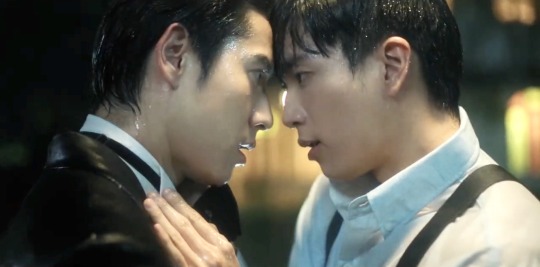
More modern set stuff:
City of Stars deals with having to leave the closet as a super star. So does Close Friend Season 2 a little. The OhmFluke pair also deals with coming out to parents. Love Stage!! (Thailands version) contains one couple that chooses to remain closeted for the good of a career and another that risks it.
Moonlight Chicken - mostly about self hatred and difficulty in being out, to the point where his young nephew challenges him on it and provides a foil.

Also, ya know, TharnType and Why R U. Both have self hated and challenging coming outs because of trauma and daddy issues.
Dark Blue Kiss - Kao is terrified of being outed and it's used to blackmail him.
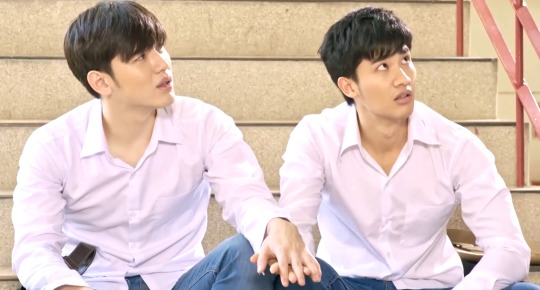
Similarly although he is out of Ae, Pete is being abused and blackmailed because he is gay in Love By Chance. Also Ae doesn't manage to come out... yet.
I Told Sunset About You - of course.
My Gear and Your Gown final episodes contain homophobic (or are they?) parents.
Second Chance heavily implies that there is something going on with Paper's inability to accept Fah.

Similarly Gene accepting Sib in Lovely Writer.
I'm pretty sure there's a ton of homophobia at the back end of My Tee, but honestly it's been years sicne I watched that mess.
Charming little pulp 21 Day Theory deals with quite a bti of this, but our main character has a lovely gay uncle to guide the way.
"Punch the homophobe" my favorite trope of all time, happens in Oxygen. But otherwise they neatly circumvent the patriarchs objection by defacto adopting a child to inherit.
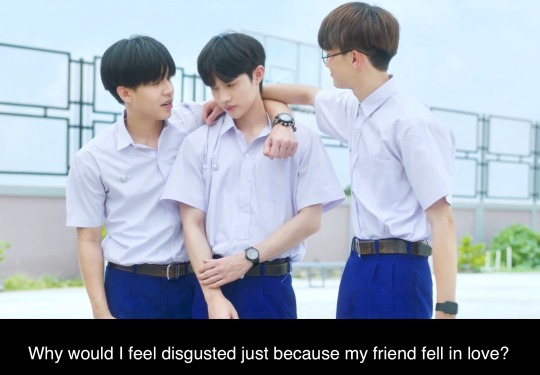
TonhonChonlatee is all about one characters inability to acept his own queerness as encouraged by his homophobic family and various other evil characters.
My Only 12% actively tackles and calls out cultural homophobia and damaging misrepresentations.
"Why does everyone think that both of them are strange? If it's not wrong, why does everyone hurt?"
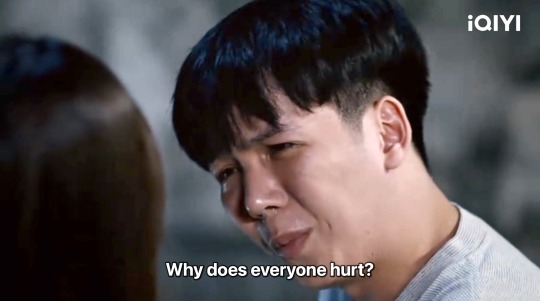
The show he's talking about is Thailand's first proto-BL, love of Siam and it is about an inability to come out.

From Japan
Life: Love on the Line - it's parental disgust and personal self hatred and paranoia that breaks them up (they get back together but he as to get over it)
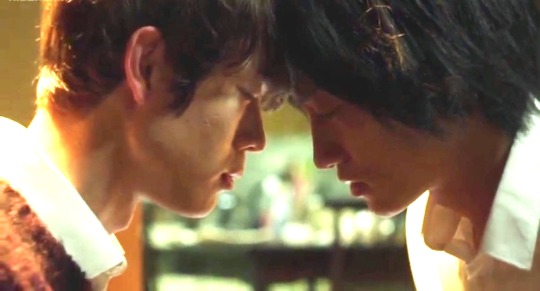
Similarly His - is a kind of reunion romance after self-homophobia drove one half of the pair to marry someone else.
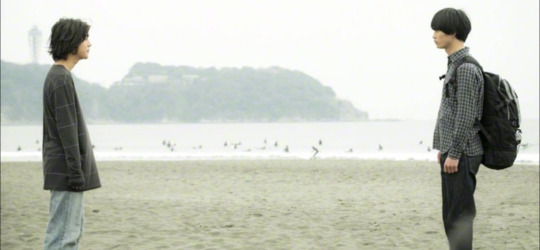
Actually the original series with the same characters, His the series, also deals with self acceptance around gayness, and it's subtle (Japan) but it's pretty clear one of them was kicked out of/ or left his previous school because he got outed. (Light on Me references a similar situation, but it's ultra subtle.)
If It's With You also kinda falls into this category. Not sure these can be called "dealing with" it tho, more side stepping and alluding to it.
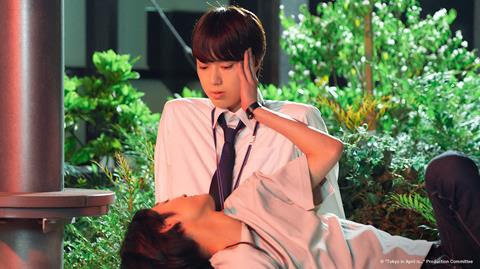
Tokyo in April is - yeah it's kinda the whole thing from one half of this pair
What Did You Eat Yesterday also has a coming out to the parents thread throughout, and a coming out at work thing, but it's not really the point of the show.
From Korea
Most Korean BL are gonna be out. The specialize in the bubble. Although a case could be made for Love For Love's Sake and Love Class. And, see comment, Jazz for Two.
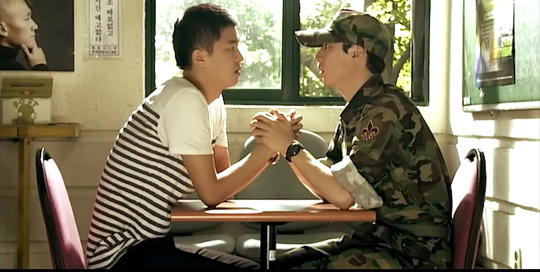
One noted exception is Just Friends which is a short piece about coming out to mom while on leave from the military. This is one of Korea's earliest BL pieces and not strictly BL, but it's fascinating in that neither theme (military nor coming out) would reall be reused again.
From Taiwan
My Tooth Your Love - has a kinda different take and we aren't sure, as viewers whether it's because he's gay or because he's not doing what the Patriarch wishes. But trigger warning for [physical abuse.
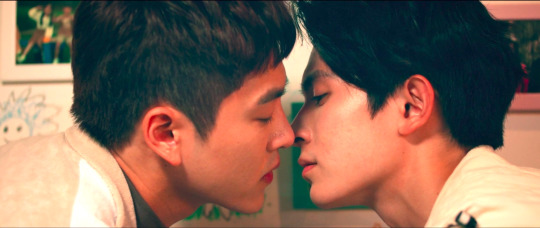
DNA Says Love You deals with this and other forms of queerphobia during the later half. Slow start but I do love this show.
Faded is a propaganda piece (pro marriage equality) which is all about coming out to a parent.
In H4CTY Xing Si (of the side couple) is having a hard time coming out but that's complied by the fact that he's fucking his stepbrother, it's a mess, bit I enjoy them - v problematic couple tho.
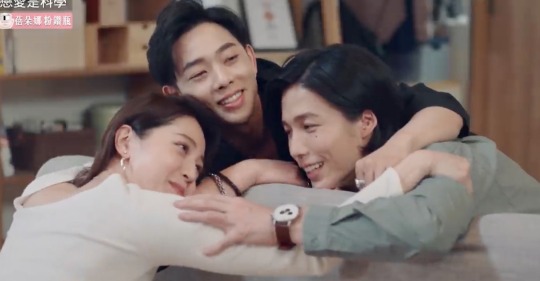
Papa & Daddy actually has a coming out sequence (GASP!) where the parents don't take it well as does Love is Science? (sides) - but the later is mostly because disaster bi is also baby daddy.
Red Balloon, of course, and it's sibling movie Your Name Engraved Herein are kinda all about self loathing and suffering because of gayness and lack of acceptance.

Unknown is certainly tackling some of this.
In which I talk about some of my favorite coming out sequences:
He's Coming to Me has my favorite series of coming out sequences to both friends and mother.

A few more that I really don't like (Promise) and probably Together With Me should be here, but I willfully can't remember them.
(source)
#bls with angst around coming out#bls that deal with homophobia#bls that are not set in the bl bubble where gayness is 100% accepted#mostly thai bl#thai bl#japanese bl#taiwanese bl#historical bl
59 notes
·
View notes
Text
BL: Romancing in a Bubble?
As always, please let me know if you have suggestions, critiques, comments or corrections.
I will only be discussing BL broadly (here I use BL as an umbrella term) and not just live action. I don’t want to club together BL and GL since in spite of their shared roots they are very different in their genre conventions, target demographics, and history. Also, I am not very familiar with it.
youtube
I consider BL a genre in itself – practically well as the way Masala is a cinema genre.
Please check the content/trigger warnings before diving into the works I have mentioned below. Feel free to message or ask.
BL / romance
I don’t think BL is romance or even a sub-genre of romance. A lot of BL is romance. Many more of them have at least a romantic side to them. There is enough overlap between those genres to give the impression that BL is romance. (I remember the discussion Killing Stalking had prompted.)
But there are plenty of BL devoid of romance. Like One Room Angel, Social Reform Season, and The Orc Bride. Similarly, BL is not exactly a porn sub-genre even though there are plenty of ero-BL.
Also, there are plenty of BL where romance takes backseat such as The Night Beyond the Tricornered Window, Blue Morning, Brother, Lawless Gangster and Thousand Autumns.
BL / queer
Queer – Can I call it a genre the way I call BL a genre? Even if one were to ignore queer as method in academia, it is still so complex.
Let me quote Taiwanese tongzhi (queer) author Chiang-Sheng Kuo:
[W]hat exactly is queer literature? Is it queer literature if queer people like to read it, or is it only queer literature if there are queer characters in the books? Or is it an appendage of the queer movement? If a queer author writes a book without queer characters, does that represent a certain aspect of queer culture?
(You can find the whole interview here.)
I think the problem persist even when I think of queer as a label.
Then there is the issue with conception of “queerness” itself. Like, in a way it is a limiting term. Is it fair to call normative or customary male-male erotic practices such as masti and Launda Naach, “queer” just because that’s how it is perceived elsewhere now?
To quote what Kaustav Bakshi wrote in Writing the LGBTIHQ+ movement in Bangla:
In the last decade, the question of decolonizing queer epistemologies was being raised periodically, whereby queer politics, despite having a shared agenda of toppling heteronormativity, and queer culture, albeit having a shared aesthetics, became more and more regionalist – not in a negative sense – but, with implications of difference, which can be interpreted and understood only when one subjectively experiences the ‘region’ with respect to gender, class, caste, ethnicity, physical and intellectual ability, access to education, metropolitan cultures, and most importantly, the internet.
[T]he attraction towards the launda is not understood as ‘queer’ – non-normative or out of the ordinary – but, as an integral part of sexual life, which is not always compulsively alert to the heterosexual-homosexual binary.
Imo, decolonizing queer epistemologies comes in handy when discussing BL since there are plenty of BL dealing with:
Historical BL set in eras and locations that had customary male-male sexualities and practices.
BL with special settings, like omegaverse, with different (if any) idea of queerness.
BL / other queer content
Just as Japan has gei-comi, and other manga like Shoujo Manga Artist Minamoto-San Comes Out, and Kieta Hatsukoi (shoujo), What Did You Eat Yesterday and My Brother's Husband (seinen) beside BL manga, different countries offer diversity in queer content with noticeable overlap. But clubbing them together would not be easy. Moreover, this diversity is as much cross-sectional as it is temporal (tanbi, JUNE, shonen ai, yaoi, BL in Japan).
BL the main difference between BL and other queer genres is BL’s focus on moe (affect). Anyway, BL predates LGBTQ+ acronym. It predates de-pathologization of homosexuality in many BL creating regions. Fu-people (BL fans) were creating BL before mainstream media started representing queer people in media. Fu-people battled state and its censors everywhere along with queer people. Live action BL is commercialized and we get mostly feel-good content. But that is capitalism (and the State) reaping the dividends of decades of fu-people’s labor of love.
I wonder if it is apt to consider BL the way western queer shows (such Verbotene Liebe, Queer as Folks, Os Nossos Dias and SKAM) as benchmark when discussing BL? Won’t it be better to evaluate consider BL in relation to local non-BL queer content in BL producing countries? But then, there are BL inspired by western queer culture such as Partners by Tamaki Yura.
Here are three gei-comi that I recommend for BL audience, through which they can get an insight into non-BL queer manga from Japan (created with androphilic men as target audience) :
Fire Code by Ichikawa Kazuhide
Fisherman's Lodge by Gengoroh Tagame
Coming Home by Go Fujimoto
Here is my BL versus gei-comi list which I think highlights their differences and similarities (I have included only Gengoroh Tagame’s works since they are probably the easiest to access/buy/borrow):
Do You Remember South Island P.O.W. Camp? by Gengoroh Tagame || Hitori de Yoru wa Koerarenai by Matsumoto Yoh
Arena by Gengoroh Tagame || Jinx by Mingwa
Cretian Cow by Gengoroh Tagame || The Orc Bride by Madobuchiya (Nishin)
Uo to Mizu by Gengoroh Tagame || Terpenoid by Okadaya Tetuzoh
My Brother's Husband by Gengoroh Tagame || The Story of My Brother by Ike Reibun
There is lot of overlap between BL and gei-comi. Gengoroh Tagame first published in JUNE (a magazine that contributed to BL we know now). There are magazines and anthologies (Nikutaiha BL) that offer crossover between different streams of queer content.
Similarly, there are danmei (Chinese BL) novel written by queer men such as the autobiographical works: Six Records of a Floating Life and Waiting Until 35 Years Old by NanKang BaiQi and Bei Cheng Tian Jie (北城天街) by FeiTian YeXiang.
BL / Queerness - exploration and conflict
Here are some live action BL (I’m not including some of the more famous ones like TharnType and Wedding Plan) where plot is rooted in character’s queerness and its exploration or implications:
Lan Yu – first danmei to get live action adaptation. The central conflict is rooted in the queerness of its characters, particularly Chen HanDong.
A Round Trip to Love and Irresistible Love – based on danmei by Lan Lin. These are part of a shared universe. The former has both ‘coming out’ (Cheng Yichen) and ‘leaving home’ (Lu Feng).
In the latter, all the conflict is rooted in compulsory heterosexuality and we get the perspective of not only an amphiphilic (bisexual) man (Xie Yan) but also an amphiphilic woman (Xia Jun) of the same social class.
Boys Love: The Movie
No Touching At All (2014)
Udagawachou de Matteteyo (2015)
The Cornered Mouse Dreams of Cheese
Sing in Love (2022) – Queerness is part of the main conflict.
Mood Indigo
Life: Senjou no Bokura
Light on Me
I don’t keep track of these things usually, so this is based off memory.
In Japan, most BL has dealt with the struggles of being queer in a largely heterosexist society since the days of tanbi and shonen-ai (such as Zankoku Na Kami Ga Shihai Suru by Hagio Moto). JUNE gained notoriety for focusing on it and yaoi boom was movement away from that. Then yaoi gained notoriety for existing in a bubble. When BL started to treat heterosexism in society as a part of the narrative, it garnered praise for being ‘transformative’.
BL has managed to carry within it different modes of identity and queerness.
Take Okane ga Nai (No Money) by Hitoyo Shinozaki and Toru Kousaka for example.
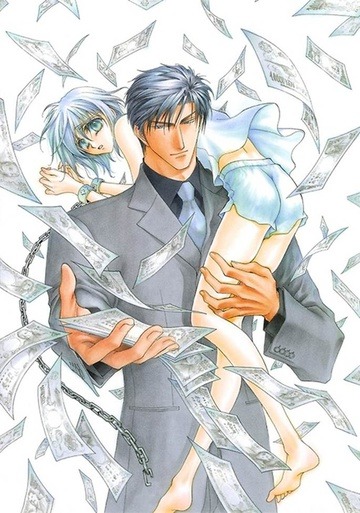


It is often held up as the epitome of all that is wrong with BL (or yaoi as anglophone fandom calls it). What’s less talked about is the main character, Ayase Yukiya’s queer angst and his exploration of identity that spans several volumes of the manga series. Kano on the other hand doesn’t struggle with his identity at all since his attraction to Ayase is driven by a very strong, initially unreciprocated emotional connection dependency (formed when his father died and he was at his lowest). For him, sexuality is merely a form of expression of his attraction for Ayase. Therefore, it does not inform his identity in anyway.
Within cannon, Someya and Honda’s pairing offer contrast to Ayase and Kano’s pairing. In a way, Kano and Someya have post-queer and pre-queer identities, respectively. Someya is a self-actualized person who mentors other queer characters (club staff, Ayase, Honda, Kano). There is a lot of give and take that happens between Ayase and all the queer people he meets at Someya’s club. Ayase's and Honda’s struggles with identity and sexuality are juxtaposed with Kano's and Someya's self-assured disposition.
That is also why I don’t think I Told Sunset About You stands out much. It can easily fit into the BL fold because there are plenty of BL that approached the same theme as I Told Sunset About You in a similar fashion (including these live action BL: His - Koisuru Tsumori Nante Nakatta, Life: Senjou no Bokura and The Cornered Mouse Dreams of Cheese).
I recommend the danmei novel Sissy by Shui QianCheng, the author of the works Beloved Enemy, My Stand-In and Meet You at the Blossom are based on, for a more detailed exploration of heterosexism, including femmephobia and homophobia.
Sissy, Beloved Enemy and Professional Body Double (the novel My Stand-in is based on) are all part of 188 group (a shared universe of novels).
There are plenty of other BL from other region that are focus on themes such as heterosexism and compulsory heterosexuality. Here is such a one-shot: Romantic by Motoni Modoru (part of the anthology Tanbishugi).
BL / terms
I like BL and associated terms like danmei because of the culture and the history associated with those terms. Tanbi and danmei are different readings of same characters 耽美 but they represent very different things. Shonen-ai literally translate to boy(s) love but that term (or BRM (boys’ romantic manga) as Emiko Nozawa puts it) carries within it so much history and specific artistic styles and sensibilities. Waai is derived from yaoi/yuri but there are fu-cultural processes, very different from that of yaoi creation, behind the production of Y-novels. I learned a lot from exploring these words alone.
#japanese bl#korean bl#thai bl#bl meta#ql meta#homophobia#heterosexism#queer#queer media#queer culture#gei-comi#gei comi#bl recommendation#danmei#188 group#188男团#bl analysis#asian ql#ql dramas#I Told Sunset About You#itsay#no money#Okane ga Nai#multiple works mentioned#chinese bl
24 notes
·
View notes
Text
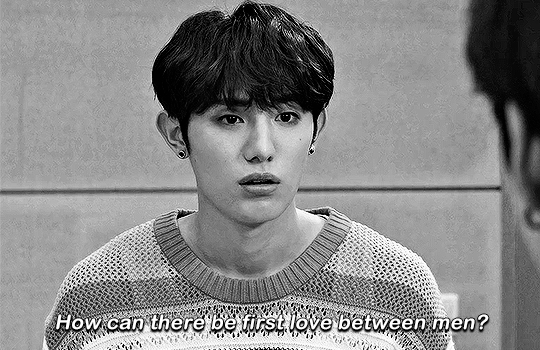
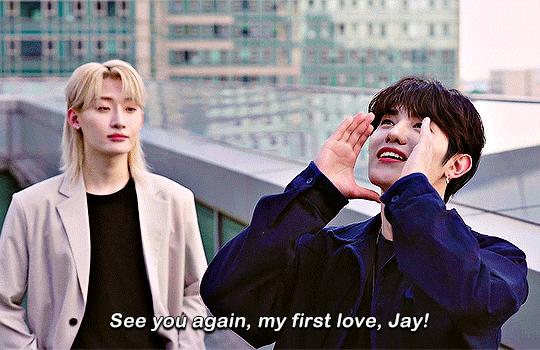
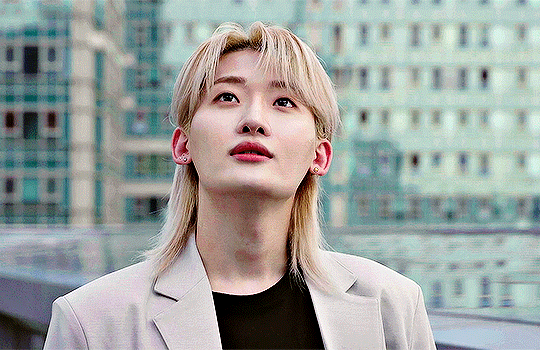
character growth
#eden went from heteronormative mindset to internalized homophobia to “i don't care if they find out”#i love seeing this type of character growth it reminds me of mickey milkovich the love of my llife#onlyoneof#bump up business#bl series#bl drama#korean bl#kdrama#kdramagifs#kpop#lee yongsoo#onlyoneof mill#onlyoneof yoojung#lee taeyeob#also while making those gifs i realized i didn't gif any jay scenes wtf#yongsoo
80 notes
·
View notes
Text
Saw a video talking about real life thai couple getting married and it was speculating that MewTul might be next. And I learned that there are people who still think this fanservice. Because they haven't said the words We Are Dating.
AND I JUST.............
Guys I know that the delulu fans who cross the lines with shipping get a lot of deserve flack but the people that insist everything is fanservice and fake and all a scam are also going into an extreme horrible place.
I also saw a comment that basically boiled down, "We don't want to be duped again" and it made me want to scream.
Mew has been one of the few actors that straight up said s ship was fanservice. He and Gulf were doing a JOB!! It was in their fucking contract.
FANSERVICE WAS PART OF THEIR JOB. They weren't intentionally lying to you because they are bad people who need to be punished forever and never believed again.
IF YOU ARE MAD WITH THE FANSERVICE NOT BEING REAL MAYBE YOU SHOULD EXPRESS YOUR FRUSTRATION BY STOPPING SUPPORTING THAT KIND OF PAIR BRAINDING.
MAYBE START GETTING MAD AT ME MIND Y FOR MAKING FANSERVICE PART OF THEIR JOB.
I do not understand why are poeple mad at Mew for the fanservice being fake. That wasn't his fault. He was doing his job.
Ultimately I think we should all getting more comfortable at just taking the actors at their word. And maybe not just assume they are all lying liers who lie and that everything they do is fake.
Like there has to be a balance between being too delulu about fanservice and crossing the line and a paranoid cynic that calls everything fake.
Let us stay in the middle of that particular spectrum please.
#ITA Original#hot take: I DON'T CARE IF THEY ARE LYING#straight up i don't give a shit#i just don't believe that straight up lying about being in a queer relationship is worth the very real homophobia that still exist#and the family conversations and potential fallout#the fact that huge portions of thai enterteinement industry outside the QL bubble are going to restrict access to openly queer artists#like i straight up don't believe it's worth it for them to lie#BUT WHAT IF THEY ARE#good god why would i give a shit about that#why would you#bl stuff#mewtul#tul pakorn#mew suppasit
24 notes
·
View notes
Text
I think the boss is kind, strong and beautiful
Reading the earlier chapters again with the idea of revaluing Doumeki’s maturity, made me realize how little I should have taken things at face value without questioning them. Since Doumeki was called “stupid” a lot, or even “hachiko” like Nana Komatsu, I just thought that he was meant to be a little naive, a fish out of water, new to the yakuza life. But that is a big mistake, considering that he was in the police and he spent time in prison, but mostly he had to grow up abruptly from his attitude to take life passively the moment he beat up his father. I talked about it in a previous analysis. Other characters expressed those thoughts about Doumeki, that he was strait-laced and not clever enough to distance himself from Yashiro or too infatuated with him to the point of enduring everything his boss asked. That’s only in part true, but not quite how I think we are supposed to interpret him when we look closer. The scene I am going to analyze tells me a different and interesting story and also discusses in a very subtle way a theme that I feel it is more relevant than ever: homophobia.
In chapter 6 Doumeki brings Nanahara back to the clinic - we only can assume that he had it out again with some of Ryuuzaki’s underlings. While Kageyama removes his bandages, Kuga comes in. It’s the first time Doumeki meets him. Up until this point Doumeki has been observing and collecting information quite discreetly and he knows two things: that Yashiro is in love with Kageyama, but has never slept with him (Misumi’s big mouth supplied that last bit). The assumption could likely have been that the doctor is straight.
[Saezuru is a bl manga where straight people exist and are the majority - or at least men don’t make an habit of sleeping with each other - if we read it closely enough and from a realistic perspective, and if we pay attention to how homosexuality or sex between men is actually treated and judged by most characters. At least that is how I am reading it, I am not looking at these characters to pair them together, as my personal preferred approach].
Meeting Kuga at this point is another important piece of the puzzle Doumeki is putting back together silently, in his mind, and discreetly. In this part of the story, Doumeki does what he is told or ordered, yet he is collecting pieces of information and building a strategy for his current goal or desire: to keep his place close to Yashiro.
Kuga-kun is an interesting character. He was able to beat Nanahara, and that alone is quite impressive (I believe they both know how to throw punches in a professional manner). He is lively and doesn’t spare words about his dislike for Yashiro, speaking about him or to him impolitely and without honorifics. To Doumeki he says: “I don’t really like him, you know. I have no idea what he’s thinking, he is a pervert. In all honesty, you hate him too, don’t you?” and Doumeki here has an interesting reaction. In a deadpan way he voices his opinion: “I think the boss is kind, strong and beautiful”. The first reaction to this is laughter and we are probably meant, as readers, to participate a little in making fun of Doumeki’s supposed naivety. Kageyama tries to make Kuga hold back but at the same time: “I understand how you feel, but don’t talk about it now…”. While Nanahara is ready to protect Yashiro’s supposed honor by challenging Kuga to have it out again. Kuga laughs: he clearly expected that a serious looking ex cop would secretly hate someone like Yashiro, not only a homosexual, but also flaunting it. [I am simplifying Yashiro’s sexuality here for the purpose of staying on topic, this is how these characters are seeing it mostly and reacting to]. The entire thing is half played for laughs, while also displaying Kuga and Kageyama’s homophobic tones. Doumeki’s statement is met by disbelief and embarrassment, Kuga even questioning his sobriety. But seriously as ever, Doumeki doubles down: “I respect the boss. Is that so funny?”. Yoneda dedicates a panel to each person’s individual reaction, Kageyama in shadow, subtly looking back behind his glasses at Doumeki, perplexed or troubled by his words. This three panels, when we look at Kuga, Kageyama and Nanahara being silent, give a sense of pause and suddenly the whole atmosphere changes and Kuga apologizes to Doumeki. An understanding has been reached, something has passed between these men in this room.
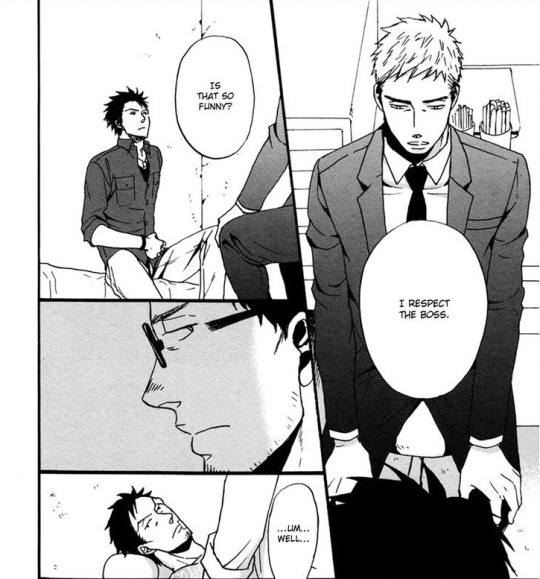
Now Kuga is open and friendly to Doumeki and wants to know his name. He introduces himself properly and says something really really relevant for the point Yoneda aimed to: “I’m Kuga. I work as a bartender or club staff. Oh and I’m also this old man’s boyfriend “. Even Nanahara didn’t know that. Kuga chose to out himself and Kageyama to Doumeki. This is seamlessly done, it is subtle as a coming out scene, built organically and probably would pass under the radar very easily. But I think that is how people really would interact in the world Yoneda Kou is portraying. I already wrote a little about Kageyama, in my opinion one of the characters that displays his internalized homophobia more bluntly, especially in his open contempt for Yashiro’s “sense of morality” or “dangerous lifestyle” [his words, not Yoneda’s personal view nor mine]. Yashiro brought Kuga into the doctor’s life and made him confront a side of him he wanted hidden, yet at the same time Kageyama keeps thinking that homosexuality should be kept discreet, behind closed doors, and that Yashiro is only looking for trouble by being open about it.
The scene ends and we go back to a pensive Yashiro. In the end of the chapter we are in his POV and discovering that Kuga, Kageyama and Doumeki went out to drink together. It’s an interesting development, significant because it means that the couple feels comfortable now in front of Doumeki and they can be relaxed and be themselves and this opens the possibility for Doumeki to speak to Kageyama and to ask openly about his relationship with Yashiro.
I think this aspect was worth analyzing and I am sorry 😞 it is more long than I wanted. Also I am not putting a lot of images in my analyses out of respect for the copyrighted material and Yoneda Kou. It is still available easily and I think this type of deep dive into Saezuru only makes sense if you have read it entirely and are a fan, which implies that you have a copy of the manga. To be continued…
#saezuru tori wa habatakanai#saezuru analysis#manga analysis#yashiro#doumeki chikara#don’t stay gold#yoneda kou#eri reads saezuru#homophobia as a theme in bl manga#coming out scene in bl manga#yoneda Kou treating topics seamlessly and organically is worth praising#queer coding characters in manga isn’t really a thing since japan didn’t make a habit of policing representation of sexuality in media#please reach out to me if you find any mistakes
37 notes
·
View notes
Text









#homophobia? in my korean bl?#but honestly this explains a lot in terms of donghee/hotae#unintentional love story#tw abuse#tw homophobia
139 notes
·
View notes
Text
The Eighth Sense
This series feels so true to the queer experience while not having homophobia be the plot
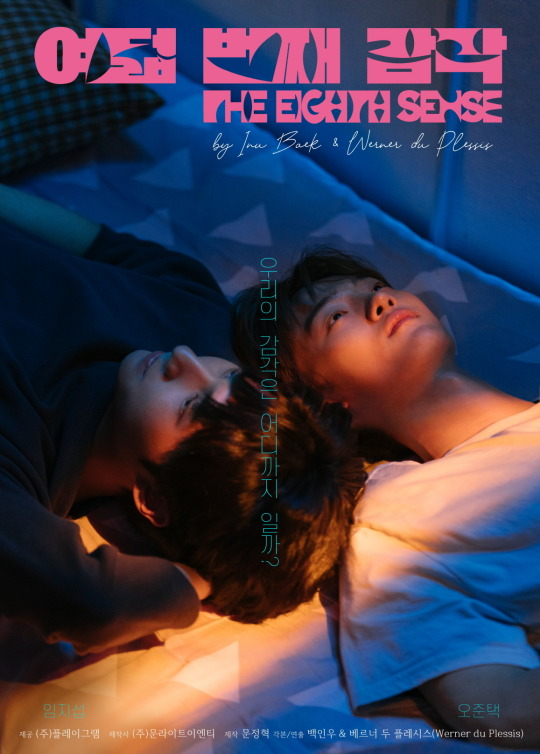
#the eighth sense#I’m currently rewatching it because it’s one of my favorite serie#it’s so beautifully written#a lot of queer media had the sole plot point that homophobia exicsts#and weve been knew like we know it exists but i want to see stories go beyond#queer people deserve more representation in the form of happy endings#we want stories where theres is more than only tragedy around being queer#the eighth sense series#koreanbl#bl series#kdrama#bl drama#queer media#the eight sense
41 notes
·
View notes
Text
Ter is an asshole but if he's also so deep in the closet he's discovered a land beyond Narnia and is taking that out on himself and Dee by flirting with him and using him to express feelings he's afraid of in himself and then trying to figure out how to keep feeling those things without having to do what he views as a huge risk and like, he's an asshole and he is horrible but there could be so much more.
There probably isn't.
But the idea of self-hating gay man who saw Dee as a chance to feel something without a risk only to fall in love with an actual out gay man... I want to believe in that story. I want to see that Ter is an asshole not because he's in the closet but because of how he treats people who aren't in the closet.
I want complexity and layers and to feel bad for him because he hates that side of himself so much but to also know that he is a fucking asshole for expressing his own self-hatred that way.
#wandee goodday#wandee goodday the series#bl drama#thai series#asianlgbtqdramas#i am sure this isn't common#but i love characters suffering from internalized homophobia#and pod does that SO WELL#i have missed his specific brand of Deeply Repressed
47 notes
·
View notes
Text
Never seek to tell thy love
Love that never told can be
For the gentle wind does move
Silently invisibly
-William Blake


Played around the Photobooth again. 😌
#zayraf#zayne x rafayel#love and deep space#love and deepspace#love and homophobia#alternate universe#fandom#fanwork#gay shit#i will go down with this ship#i love them your honor#zayne love and deepspace#rafayel love and deepspace#gay gay gay#gay couple#gays#gay#yaoi bl#yaoi#yaoi boys#proship#proshippers please interact#they should kiss#they should make out#they should fuck#yes your grace#sorry not even remotely sorry
12 notes
·
View notes
Text
Love For Love’s Sake’s production company must be so relieved right now that they listened to the backlash and let the drama stay a BL ajsjsksks
#crazy that lfls and that high school gangster kdrama were announced at around the same time#and they were both initially announced as bromances adapted from bl#and then from then on the two dramas went off in radically different directions#with lfls production company listening to the backlash from both fans and ppl working on the show and let the show stay a bl#while that high school gangster kdrama’s production company doubled down on the homophobia#and now lfls is the biggest kbl of 2024 so far and is highly critically acclaimed#while the high school gangster kdrama is a flop and the production company is now in financial trouble#pays to not be homophobic#love for love's sake#love supremacy zone#kdrama#korean bl
10 notes
·
View notes
Text
there are not enough Be My Favorite reactions on youtube and tumblr, my brain isn't stimulated enough :(
#the horrors#the homophobia of it all#people should stop sleeping on bmf aka amazingly filmed incredibly acted and kindly storytold#be my favorite#thai bl#bl series#gmmtv#bmf#i want to see new people discuss it and go over details and react to the different timelines and character developments aah
18 notes
·
View notes
Text
Let’s talk about Uncle Jim and the preview of episode 7.
I think we need to look at Uncle Jim as a product of circumstances.
It’s easy to call him a hypocrite if you are only looking at the fact that he’s, essentially, pointing fingers at his nephew, Li Ming, for being gay while he’s out there having sex with Wen and whatever their ‘situationship’ is a the moment. Now, I’m not saying it’s was okay, or anything of the sort, on how he will be dealing with finding out about Li Ming and Heart, but I think we do need to go beyond the surface level, “He’s a homophobe!” virtue-signaling that has been going around and look at the complexity that lead to that moment.
I'm going to break this down into three parts: (1) Uncle Jim's financial struggles, (2) Uncle Jim's struggles with his sexual identity, and (3) how they play into the confrontation.
1. Uncle Jim and the effect of poverty on his worldview
First, we need to look at what Uncle Jim’s relationship with Li Ming. The first clue into the relationship between Uncle Jim and Li Ming is in Episode 1 while Saleng and Li Ming meet up. Saleng let’s Li Ming know that it would be best if he came back to the diner straight after school so Uncle Jim wouldn’t nag him again, and Li Ming being the teenager that he is, blew off the advice stating to just let Uncle Jim nag. Tensions between the two are already somewhat heightened, which tends to naturally occur as kids grow into their teens and don’t see eye-to-eye with their parental figures. Add in the fact that Li Ming is growing up and starting to make decisions for his own future, and Uncle Jim doesn't agree with a lot of them, their relationship is going to be rocky.
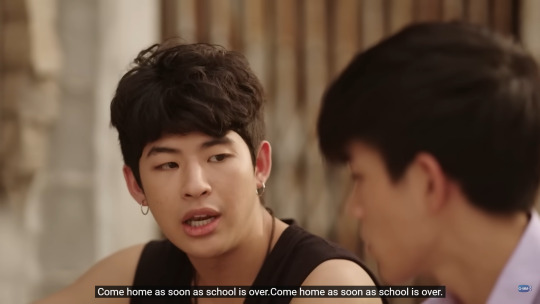

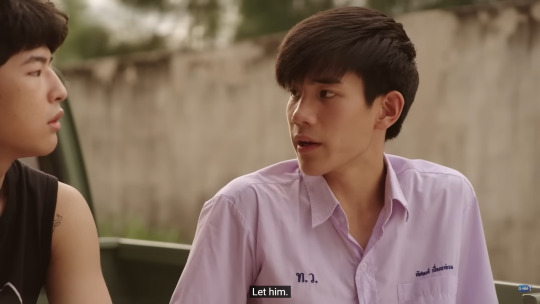
Second, Uncle Jim knows his place in a classist society and has conformed to it. Time and time again, in the conversations with Wen, Uncle Jim has diminished his work as a chicken vendor. It's a labor-intensive job. Even with a diner that's packed and being on television, the amount of money is not enough to pay the bills. Chicken prices have been going higher and higher, which the audience is informed through Gaipa's mother, and he's barely able to stretch the income that the chicken shop is bring to cover the bills. They are poor, living essentially paycheck-to-paycheck and just hoping to be able to get by. It's his every-day life and he's been burned out by it. It's no comfy desk job, local restaurants are looked down on. There's no honor or 'reward' for his work aside from seeing people enjoy the food that he makes with his own hands.
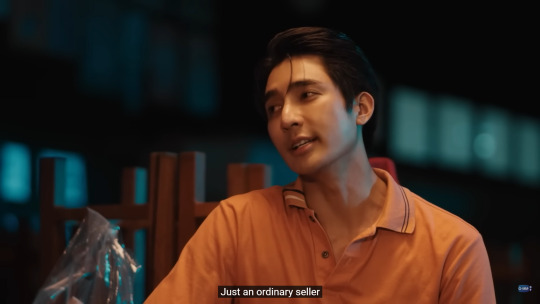
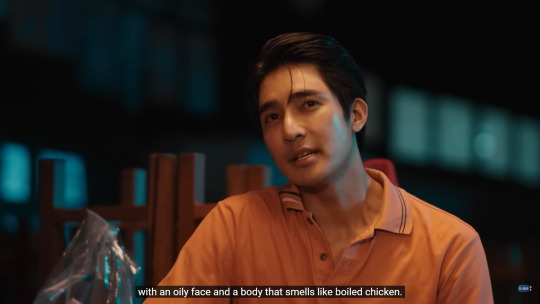
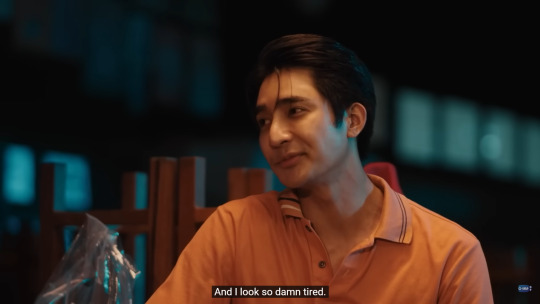
He 'knows' his place in society and behaves according to it. During the whole initial fiasco of meeting Heart's parents, Uncle Jim apologizes on behalf of Li Ming. Heart's father is an officer, a Senior Sergeant, and wealthy ones at that. Uncle Jim is more than aware of the status difference and what that signifies in the terms to the power that they hold. So Uncle Jim would rather Li Ming take the blame and smooth things over, instead of risking upsetting Heart's parents.
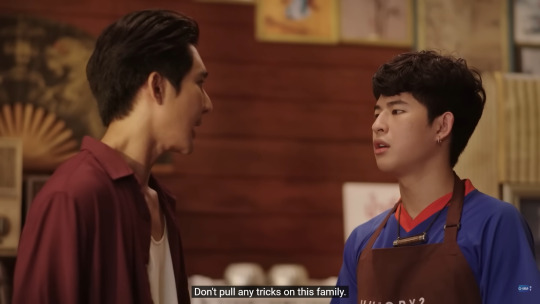
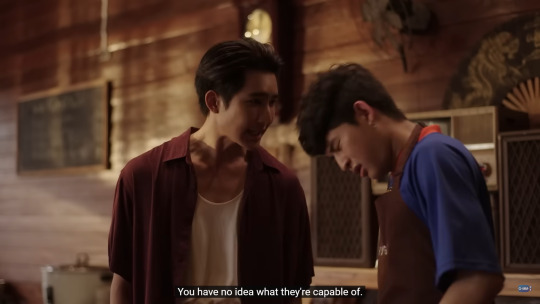
Meanwhile, Li Ming is aware of the classism and resents it. He's aware of their financial status and the power that others hold over them, as seen with his indignant response when Uncle Jim suggests just thinking of the situation with Heart's parents as 'bad luck'. Li Ming is young, that's the reality. He hasn't been worn down like Uncle Jim and as a result he still (correctly) pushes against the idea that just because Heart's parents hold a high status, he should plead guilty. He knows he's innocent because he is innocent, and he's hurt that Uncle Jim would tell him to just take the blame.
But the thing is, I don't think it's that Uncle Jim doesn't believe or trust him, more than anything Uncle Jim is worried that defying would somehow get Li Ming in more trouble, potentially jeopardizing his future.
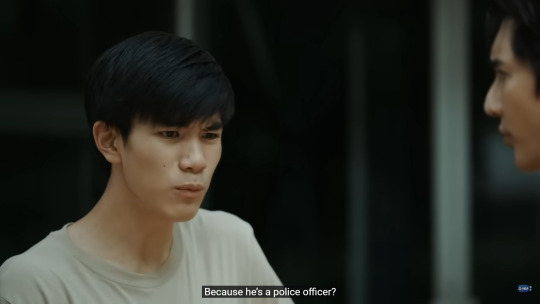
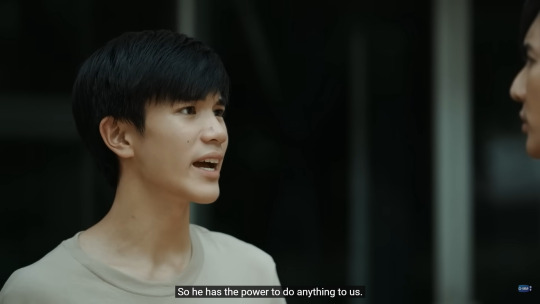

Which comes to the third point, Uncle Jim wants Li Ming to do better for himself and have a brighter future than he does. He doesn't want Li Ming to know the struggle of barely being able to pay for bills or the pain of such a laborious job. That's not to say that the way Uncle Jim goes about it is correct, especially when pushing Li Ming to study is just making him miserable and Uncle Jim fails or refuses to see that. But I think he truly believes that Li Ming would find a better life by getting a college degree. To Uncle Jim, it's Li Ming's ticket out of the misery that being poor brings; he pushes it onto him because he truly wants what's best for him.
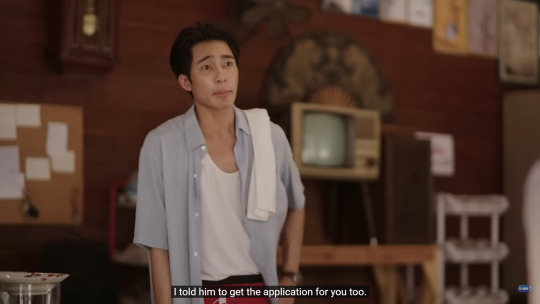

Uncle Jim, like many parents or parental figures, wants Li Ming to do better in life than he has. Uncle Jim has been worn down by life, he's essentially just floating, trying not to drown. He doesn't want that for Li Ming. Yet, Uncle Jim is so consumed by the stress of running the diner and the lack of funds that it brings in, he doesn't really see that there are other ways besides getting a college degree to be successful. (I think many children of immigrant parents/third-world countries can relate to the pressure parents apply in succeeding in their education to pull themselves out of poverty.) Which results in Uncle Jim not listening to the wants and needs of Li Ming. Uncle Jim has been tired down by the reality of poverty and he doesn't want to Li Ming to experience it, especially when he can provide Li Ming the opportunity to go to college and get an education, even if it costs him more in the long run.
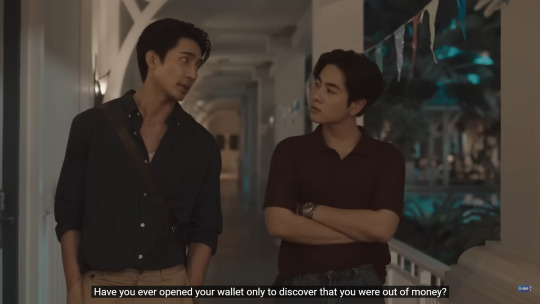
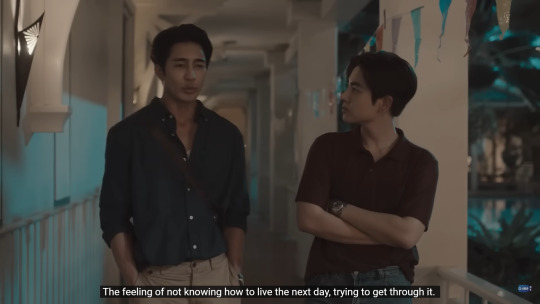
He wants Li Ming to have every opportunity and success out there that's available, ones that he didn't have. To Uncle Jim, that means getting a degree. A degree can open doors that are otherwise locked. It's a ticket out.
Uncle Jim's main motivation is Li Ming to find success, to find financial stability. It's the idea that once you're financially stable and out of poverty, only then can you strive to find happiness. Poverty, to Uncle Jim, is a brick wall that is in Li Ming's way. Getting a degree is an opportunity that wasn't awarded to Uncle Jim and it's highly likely that Uncle Jim blames that for his present struggles.
From Uncle Jim's point of view, Li Ming is almost a mirror copy of him and going down a path that led to a lot of Uncle Jim's own pain and suffering. Uncle Jim is reactive, even when he is trying to be proactive, because that's all he knows how to do to survive. It's not that he intends to harm Li Ming, but rather it's the consequence of his good intentions that he ends up hurting him. A double-edged sword.
He doesn't want his nephew to follow in his foot steps, he wants him to be better than him.
2. Uncle Jim and his journey with his sexuality
I don't think we can just state that Uncle Jim is a hypocrite and homophobic. Does he probably struggle with internalized homophobia? Probably. But I think the reaction, stems from much more than just simple internalized homophobia. Rather I suspect his reaction has much more to do with his personal relationships, both familial and with Beam, and how they have shaped his life in relation to his sexuality.
Here we're going to start off with Uncle Jim's relationship with his sister, Li Ming's mother. His sister told him explicitly that she doesn't believe that gay relationships to work. She compared them to straight relationships and essentially, in lack of better terms, told Uncle Jim that they were inferior. Wen even states, "Love has no gender. everyday, heterosexual couples split up. No one bothers to find out why they break up. gender has nothing to do with successful or unsuccessful relationships." Even though logically, Uncle Jim understands that, the reality was that his sister's words rang in his mind after he found out that Beam was with a woman, while also being with him.
He was burned after taking a chance. When you get one too many burns, fear starts to become standard response.

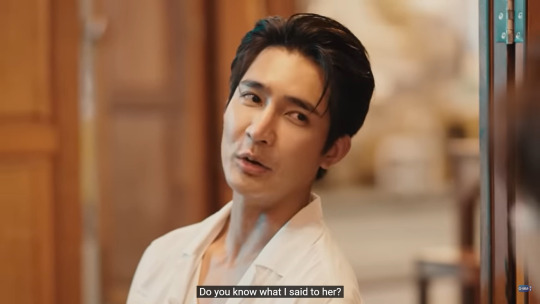
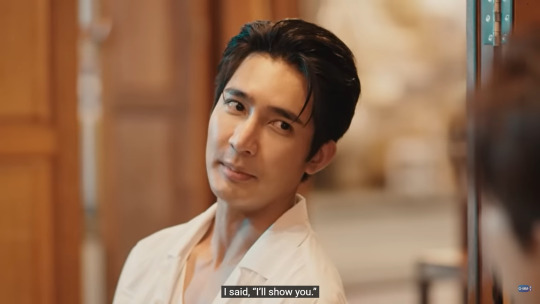
Uncle Jim's relationship with Beam has a lot to do with how he NOW views love and the place it has in his life. Uncle Jim opened up the chicken dinner in hope to help provide for Beam. I mean they were wearing rings, it was a very serious and committed relationship. Uncle Jim, in his 20s, took the risk of losing his family for this man, to prove his sister wrong. Where did that lead him? To unknowingly being the sidepiece in a straight relationship. And then Beam goes and dies before Uncle Jim could get any answers.
For about a decade, Uncle Jim was left to wallow in his pain from the wound that Beam left him. He had no clue whether Beam actually loved him. Not to mention that he, a male, was the sidepiece. This isn't just simple cheating, instead it's rather significant that Beam was cheating on his long-time girlfriend/fiancée with him. While Uncle Jim and Beam may have had a ring on each other's finger, it says something that he was the hidden lover. How could Uncle Jim not wonder if Beam was using him/hiding him due to being ashamed of being gay? Or question if he was every truly loved?

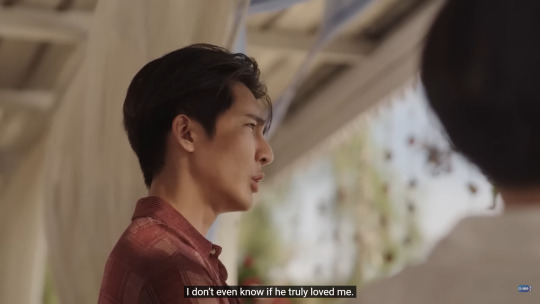
Uncle Jim was left stagnant after Beam died, there was no way to come to terms with being the side-piece to a straight relationship. There was no clarity or closure that he could have gotten to move on, because the only person that could offer to him, died.
It's obvious that his relationship with Beam shifted on how he felt about love, Uncle Jim states that several times to Wen. The relationship (being the hidden side piece) likely changed how he felt about being gay and gay relationships, potentially subconsciously. It wouldn't be shocking if he attributes some of his struggles to him being gay.
Uncle Jim risked his family, attempting to prove his sister wrong, and instead it backfired. A lot of pain and suffering that Uncle Jim has experienced in life has been due to his relationship, and it wouldn't be a giant leap to think that he attributes the pain specifically to having risked everything for a man. And he'd been stuck in that mindset for so many years, relationships meant potential pain. He'd gone against the status quo and that's why he got burned.
He's still barely learning to love again, learning to let go of the past.

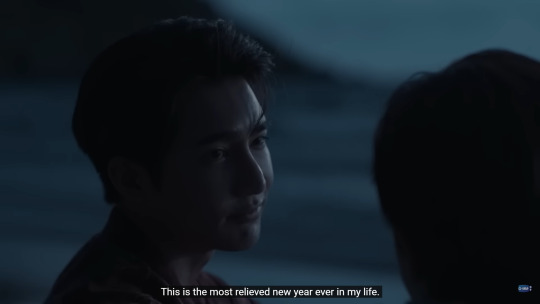
3. How both factor in Uncle Jim confronting Li Ming about his relationship with Heart.
I think it has been established that Uncle Jim has just been in a land of pain, where he was left just a shadow of his bright 20-something-year-old self, after running the chicken diner and having a horrific ending to what seemed like a promising relationship.
Uncle Jim is only starting to reemerge and learn what it's like to live again after meeting Wen. Sure, he probably did have moments in his day-to-day life where he could laugh and smile with others, but those were fleeting moments. He was and has been struggling in every single aspect of his life, in his love-life, his financial status, his class status, he sexuality. Uncle Jim, by not being part of the status-quo, has lived a difficult life.
That's the exact opposite of what he wants for Li Ming. He wants him to be happy, to be stable, to not suffer like he is suffering for the decisions that he made as a young-adult. He's scared and afraid for the future of his nephew, because Li Ming is not willing to conform. Li Ming is resentful and indignant with society, like many young teens are, and isn't ready to bend to the rule of those with higher status. That almost guarantees that he's going to face hardships and that scares Uncle Jim.
If that wasn't bad enough, Uncle Jim finds out that he both doesn't want to get a higher education after graduation and he's gay. Two more attributes that almost guarantee a lot of pain in society, even if there has been large strides in LGBTQ+ relations since Uncle Jim came out.
When Uncle Jim sees Li Ming it's like staring at his own reflection and that scares him. He doesn't want Li Ming to end up like him, struggling for money and not fully accepted by society. It's a fear that only a guardian can truly understand.
Uncle Jim has only known pain since finding out about Papang cheated. Even though he now loves his diner, I'm sure it was painful before because it was a reminder, one that he has given his blood, sweat and tears for. He's only now coming out of the haze, from a zombie-like state, so the way he communicates isn't eloquent, it's forceful and harsh. He doesn't know how to effectively convey his worries to Li Ming and he doesn't know how to listen, to learn that maybe there is more than one way to achieve happiness and stability.
He's not mad at the fact that Li Ming is gay, but rather he's mad that after everything he has done to avoid Li Ming growing up to be like him (poor, struggling, tormented), Li Ming is still going to end up where he is. His mirror.
It's not okay that he reacts in the way that he does, I'm sure it'll hurt Li Ming more than anything, but it's also not shocking to see that Uncle Jim is angry. Angry at the situation... a repeat of his own in his eyes. And I think that it's more complicated than just a cry of "Uncle Jim is homophobic."
TLDR; Uncle Jim's outburst against Li Ming for being with Heart isn't solely rooted in homophobia, though there may be an aspect of internalized homophobia. Rather, Uncle Jim is a product of his situation and he doesn't know how to effectively communicate with his nephew. He's struggling and he doesn't want that for Li Ming. That's not to say that it's okay that Uncle Jim confronts Li Ming for being gay, especially in that manner, but it's not surprising when he reacts in that way.
#Moonlight Chicken#Uncle Jim#Wen#Midnight Series: Moonlight Chicken#Thai BL#Earth x Mix#mlc: Uncle Jim#Li Ming#li ming x heart#earth pirapat#mix sahaphap#fourth nattawatM#Moonlight Chicken ep 7#Wow this is much longer than I intended it to be#I'm sorry if you actually read through all that#I'm just tired of people thinking its solely homophobia without considering the lived experience that he has come through#It's not okay that it's reaction but i don't think you can chalk everything up to homophobia#not a defense just an explanation#this ended up with me rambling but dkdkdkd I got tired of he’s just homophobic#and then i saw people were attacking earth and it’s like guys#think a little please#Moonlight Chicken meta
79 notes
·
View notes
Text
"It's dirty and weird" says the bully guy who was all over and openly flirting with our main character just a few episodes ago, ready to sexually assault him??????
7 notes
·
View notes
Text
i wonder why bl&gl are always separated from shoujo even tho they’re a sub section of shoujo.. like whenever i see posts celebrating shoujo/josei/romance manga it’s almost always just m/f couples, bl and gl couples don’t get mentioned unless it explicitly mentions those genres… it’s just so strange to me !!! like why do we always separate the couples based on the gender, idk it feels alienating somehow 😭
#also i feel like most shojosei readers don’t real bl/gl and vice versa too#i wonder why it’s so separated :(#esp when they are basically the same genres and have extremely similiar target audiences#ngl . it feels like very lowkey subtle homophobia#in terms of how they’re always separated and bl/gl is regarded as different to m/f couples#idk !!!!!#like m/f shoujo is often discussed by the general audience but most of the time when it’s dedicated bl/gl fans talking abt those respective-#genres#i wish there wasn’t a barrier rip
13 notes
·
View notes